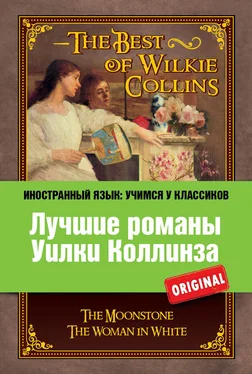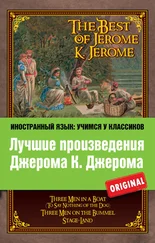The Thursday was as fine a summer’s day as ever you saw: and my lady and Miss Rachel (not expecting Mr. Franklin till dinner-time) drove out to lunch with some friends in the neighbourhood.
When they were gone, I went and had a look at the bedroom which had been got ready for our guest, and saw that all was straight. Then, being butler in my lady’s establishment, as well as steward (at my own particular request, mind, and because it vexed me to see anybody but myself in possession of the key of the late Sir John’s cellar) – then, I say, I fetched up some of our famous Latour claret [15], and set it in the warm summer air to take off the chill before dinner. Concluding to set myself in the warm summer air next – seeing that what is good for old claret is equally good for old age – I took up my beehive chair to go out into the back court, when I was stopped by hearing a sound like the soft beating of a drum, on the terrace in front of my lady’s residence.
Going round to the terrace, I found three mahogany-coloured Indians, in white linen frocks and trousers, looking up at the house.
The Indians, as I saw on looking closer, had small hand-drums slung in front of them. Behind them stood a little delicate-looking light-haired English boy carrying a bag. I judged the fellows to be strolling conjurors, and the boy with the bag to be carrying the tools of their trade. One of the three, who spoke English and who exhibited, I must own, the most elegant manners, presently informed me that my judgment was right. He requested permission to show his tricks in the presence of the lady of the house.
Now I am not a sour old man. I am generally all for amusement, and the last person in the world to distrust another person because he happens to be a few shades darker than myself. But the best of us have our weaknesses – and my weakness, when I know a family plate-basket to be out on a pantry-table, is to be instantly reminded of that basket by the sight of a strolling stranger whose manners are superior to my own. I accordingly informed the Indian that the lady of the house was out; and I warned him and his party off the premises. He made me a beautiful bow in return; and he and his party went off the premises. On my side, I returned to my beehive chair, and set myself down on the sunny side of the court, and fell (if the truth must be owned), not exactly into a sleep, but into the next best thing to it.
I was roused up by my daughter Penelope running out at me as if the house was on fire. What do you think she wanted? She wanted to have the three Indian jugglers [16]instantly taken up; for this reason, namely, that they knew who was coming from London to visit us, and that they meant some mischief to Mr. Franklin Blake.
Mr. Franklin’s name roused me. I opened my eyes, and made my girl explain herself.
It appeared that Penelope had just come from our lodge, where she had been having a gossip with the lodge-keeper’s daughter. The two girls had seen the Indians pass out, after I had warned them off, followed by their little boy. Taking it into their heads that the boy was ill-used by the foreigners – for no reason that I could discover, except that he was pretty and delicate-looking – the two girls had stolen along the inner side of the hedge between us and the road, and had watched the proceedings of the foreigners on the outer side. Those proceedings resulted in the performance of the following extraordinary tricks.
They first looked up the road, and down the road, and made sure that they were alone. Then they all three faced about, and stared hard in the direction of our house. Then they jabbered and disputed in their own language, and looked at each other like men in doubt. Then they all turned to their little English boy, as if they expected HIM to help them. And then the chief Indian, who spoke English, said to the boy, “Hold out your hand.”
On hearing those dreadful words, my daughter Penelope said she didn’t know what prevented her heart from flying straight out of her. I thought privately that it might have been her stays. All I said, however, was, “You make my flesh creep.” (NOTA BENE: Women like these little compliments.)
Well, when the Indian said, “Hold out your hand,” the boy shrunk back, and shook his head, and said he didn’t like it. The Indian, thereupon, asked him (not at all unkindly), whether he would like to be sent back to London, and left where they had found him, sleeping in an empty basket in a market – a hungry, ragged, and forsaken little boy. This, it seems, ended the difficulty. The little chap unwillingly held out his hand. Upon that, the Indian took a bottle from his bosom, and poured out of it some black stuff, like ink, into the palm of the boy’s hand. The Indian – first touching the boy’s head, and making signs over it in the air – then said, “Look.” The boy became quite stiff, and stood like a statue, looking into the ink in the hollow of his hand.
(So far, it seemed to me to be juggling, accompanied by a foolish waste of ink. I was beginning to feel sleepy again, when Penelope’s next words stirred me up.)
The Indians looked up the road and down the road once more – and then the chief Indian said these words to the boy; “See the English gentleman from foreign parts.”
The boy said, “I see him.”
The Indian said, “Is it on the road to this house, and on no other, that the English gentleman will travel to-day?”
The boy said, “It is on the road to this house, and on no other, that the English gentleman will travel to-day.” The Indian put a second question – after waiting a little first. He said: “Has the English gentleman got It about him?”
The boy answered – also, after waiting a little first – ”Yes.”
The Indian put a third and last question: “Will the English gentleman come here, as he has promised to come, at the close of day?”
The boy said, “I can’t tell.”
The Indian asked why.
The boy said, “I am tired. The mist rises in my head, and puzzles me. I can see no more to-day.”
With that the catechism ended. The chief Indian said something in his own language to the other two, pointing to the boy, and pointing towards the town, in which (as we afterwards discovered) they were lodged. He then, after making more signs on the boy’s head, blew on his forehead, and so woke him up with a start. After that, they all went on their way towards the town, and the girls saw them no more.
Most things they say have a moral, if you only look for it. What was the moral of this?
The moral was, as I thought: First, that the chief juggler had heard Mr. Franklin’s arrival talked of among the servants out-of-doors, and saw his way to making a little money by it. Second, that he and his men and boy (with a view to making the said money) meant to hang about till they saw my lady drive home, and then to come back, and foretell Mr. Franklin’s arrival by magic. Third, that Penelope had heard them rehearsing their hocus-pocus, like actors rehearsing a play. Fourth, that I should do well to have an eye, that evening, on the plate-basket. Fifth, that Penelope would do well to cool down, and leave me, her father, to doze off again in the sun.
That appeared to me to be the sensible view. If you know anything of the ways of young women, you won’t be surprised to hear that Penelope wouldn’t take it. The moral of the thing was serious, according to my daughter. She particularly reminded me of the Indian’s third question, Has the English gentleman got It about him? “Oh, father!” says Penelope, clasping her hands, “don’t joke about this. What does ‘It’ mean?”
“We’ll ask Mr. Franklin, my dear,” I said, “if you can wait till Mr. Franklin comes.” I winked to show I meant that in joke. Penelope took it quite seriously. My girl’s earnestness tickled me. “What on earth should Mr. Franklin know about it?” I inquired. “Ask him,” says Penelope. “And see whether HE thinks it a laughing matter, too.” With that parting shot, my daughter left me.
Читать дальше
Конец ознакомительного отрывка
Купить книгу












